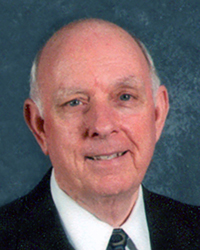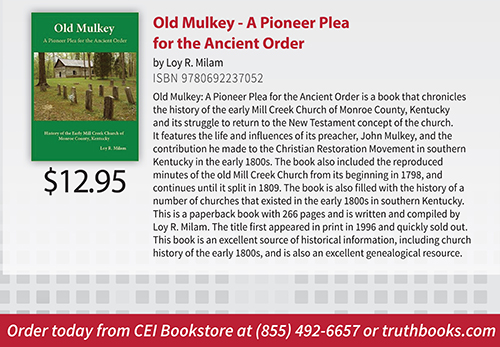

by Bobby L. Graham
Synopsis: Erected in 1804, this building is the oldest freestanding log meeting house in Kentucky. Not only is this a historic burial ground, it is also connected with the Restoration Movement.
Recently, I enjoyed re-visiting the Old Mulkey Meetinghouse near Tompkinsville, Kentucky—a primitive sort of reminder of the simplicity of past times, of the events which long ago happened in such places on the American Frontier, and the people who made them happen. People such as John and Philip Mulkey and their relatives, as well as those men and women of similar character and conviction who were willing to stand upon their convictions, have special importance in reminding us of what it means to have the "courage of your conviction." The short time which my wife and I were able to spend at Old Mulkey serves as the foundation for the ideas which here are set forth.
To the minds of many today, this description is severely lacking in dignity and sophistication. They would prefer some designation such as church, sanctuary, or campus to honor the religious connection of the place. Why not just call it what it is: a meetinghouse, a place for people to gather or meet? The simplicity of that day, and most of the people then living, would have forbidden anything but calling it a place to meet. They would not have accepted modern contrivances such as fellowship halls, kitchens, or other gimmicks, because they were determined to hold to the simple Gospel of Jesus Christ (2 Cor. 11:3-15; 1 Cor. 2:1-5). I would to God that more were thus minded today!
On that Saturday in November 1809, when Baptist preacher John Mulkey, who had preached there for the Mill Creek Baptist Church, called for those Baptists who wished to rely on the Bible alone to follow him out one door of the old house, 150 did so; the remaining fifty members exited the other door to retain the Baptist faith and practice. The larger group kept the meetinghouse.
Mulkey's opponents disparaged his efforts by calling the group "Mulkey's church," as people today still occasionally hurl such epithets as "Campbellites," when "Stoneites" would better describe Mulkey and some others. Of course, Mulkey powerfully disproved their disparagements by adhering closely to Jesus Christ and the Bible alone.
From the time of Adam and Eve, people have rejected the truth of God's word for the lies of Satan, and still long for the counterfeits of the world. I thank God that men like Barton W. Stone were honest in their appraisal of inherited religion so that they began seeing the need to cast aside all that came from men, like human names, beliefs, creeds, and unauthorized practices. Stone was one of the first to cry out for a return to the Bible alone, and others in the Kentucky-Northern Tennessee region studied their Bibles and saw the truth for this reason. I also am thankful that their spirit took them to other regions of the South and the North to teach many of our American ancestors the way of salvation in Christ (John 14:6; Acts 4:11-12; Rom. 1:16; 2 Tim. 3:16-17).
I am equally thankful for those brave souls who fought the battle of truth in England against the entrenched religious establishment. They understood that unity/oneness in Christ required belief of the truth, the only divine standard for measuring faith and practice (Eph. 4:1-6).
After Stone's migrations from Maryland, Virginia, North Carolina, and Tennessee to Kentucky, including his days of training under Presbyterian preachers, and his license to preach as a Presbyterian, he faced ordination questioning by the Transylvania Presbytery (an unscriptural body itself) about his willingness to receive and follow the Confession of Faith as containing Biblical doctrine. He answered, "I do, as far as I see it consistent with the Word of God." His Biblical orientation and direction was outstandingly clear!
Resolved to rest upon Biblical guidance only, Stone soon began questioning and rejecting the common teachings of Calvin of that time and the organizations of men. In this latter regard, he had already left the Presbyterians and formed the Springfield Presbytery; but he and a few others soon rejected even their own invention in "The Last Will and Testament of the Springfield Presbytery." Why did he so act? If one follows the Bible alone, then he must refuse all that supplants, suppresses, augments, reduces, or changes the Bible. There is no other course once he ties his path to the polar star of the Bible.
What is next when one receives the Bible as it is, in truth, the word of God, and not of men? That word then effectively works in those who believe it (1 Thess. 2:13). In other words, believers believe what the Bible says, all of it and only it! For this reason, the doctrines of Calvin had to be cast aside because of their opposition to the Bible. Organizations like regional presbyteries also had to be forgotten because of their inconsistency with divine truth. Names which pay homage to men or the creations of men (Lutheran, Episcopal, Presbyterian, Methodist, Baptist, and many others) also were sacrificed. Leaving one denomination for another does not accord with truth—denominationalism is the "fly in the ointment" with God. Leaving all such human connections is the demand of truth.
Visiting the meetinghouse, we noticed a sign placed outside the door that read, "Truth will prevail." This statement reflected their commitment to follow the Bible only. What a tribute to what happened there. God's truth is powerful, winnowing the wheat from the chaff. All who love truth will willingly sacrifice all that does not harmonize with the truth (Matt. 16:24; Jas. 1:21). Traditions, popular ideas or practices, personal preferences, and pleasurable enjoyments will become victims of truth; truth will never be a victim of these. Truth will prevail!
Hannah Boone Pennington, the youngest sister of Daniel Boone who is buried in the adjoining cemetery, was one of the 150 members prizing truth above all else. This former Quaker became a simple New Testament Christian because of her devotion to the Bible only. Though many would desire her family name to be part of their genealogies, it was not this physical relationship which won her a place of admiration in God's mind, but her devotion to truth. God gives His attention not to the "high and mighty" of earth, but to contrite souls who tremble at His Word (Isa. 66:1-2). We must manifest equal devotion to God's truth, thereby humbling ourselves to bow before Christ the King, not the will of any man (Prov. 23:23).
As Karen and I left the cemetery to walk toward our car on that Memorial Day weekend, we met a visitor bringing flowers to place on the grave of her American Revolutionary War ancestor. Her tribute was a fitting one. The old meetinghouse also stands as a simple tribute to the ancient, yet timeless plea that believers go to the Bible only for all spiritual guidance. Our tribute to soldiers of truth like John Mulkey must be on a higher, spiritual level. Only our faithful commitment to God's Word of truth can qualify as a fitting tribute for us (Matt. 7:13-14).
Author Bio: Bobby participates in fill-in preaching, Belize trips, teaching at Athens Bible School, and in gospel meetings. He and his wife, Karen, have three children: Richard, Mary Katherine Winland (Darren), and Laura Paschall (Jeremy). He can be reached at bobbylgraham@pclnet.net.
